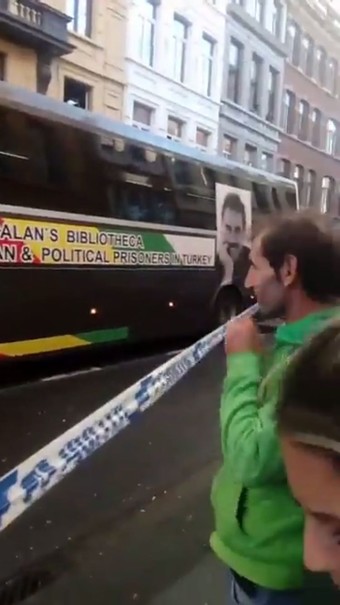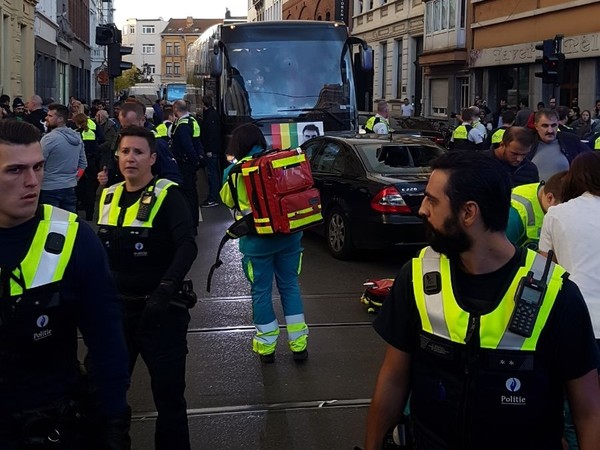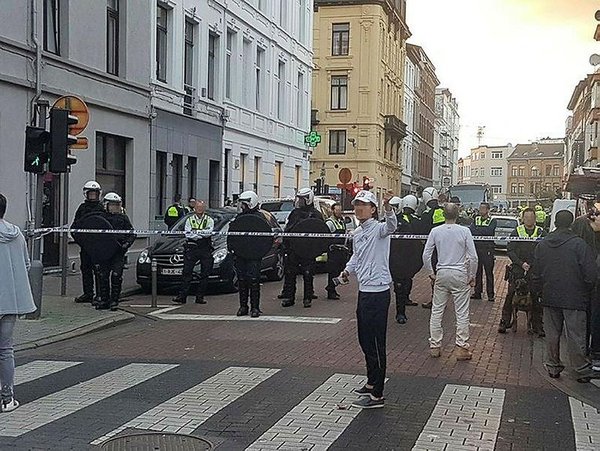A group of PKK supporters, who have toured around European cities since October 9 with a bus decorated with terrorist propaganda, drove their vehicle into a Turkish neighborhood in Antwerp with police escort. According to Belgian media and eyewitnesses, the terror supporters changed their route to provoke and attack Turks in the city, leading to five people getting injured at the scene.
Speaking to Daily Sabah, eyewitnesses described the action as a "pure provocation" and expressed their frustration at Belgian police for allowing terrorism propaganda in the country. In a statement released by the Antwerp police, it was announced that all of the five injured people, including a stabbed man, are in good health. Reports of three more injuries came later.
Furthermore, police units took 41 people into custody to ensure "public order."
Belgian Turks living in the Antwerp region have reacted to the events. Fatih Nezipzade, who was at the scene after the turmoil, stated that the bus route was intentionally chosen and confronted with "high level of provocation."

The best-selling newspaper HLN had first announced the incident as a fight between rival gangs. The daily later corrected its reporting and republished the article with the the following title: "Bus with PKK supporters provokes Turks in Antwerp: Police launch tear gas after massive fighting."
The incident took place a week after the youth branch of the PKK in Europe, which has held dozens of demonstrations across European cities over the past month, announced it would carry out revenge attacks on Turkish institutions and establishments with links to the ruling Justice and Development Party (AK Party) and the Nationalist Movement Party (MHP) in Europe.

The terrorist group claimed that neither "the capitalist modernity of Europe nor any fascist structure" will be able to stop the planned terrorist attacks. In a statement released on the Netherlands-based PKK media outlet ANF and several other pro-PKK portals, the Apoist Youth Initiative Europe (AGİA) defines all European cities as "resistance zones" where it will start its "indefinite activities." It also announced that the PKK would launch "revenge" actions against expatriate citizens across Europe.
Calling on all PKK supporters to join in attacking "all Turkey-linked institutions," the group demanded the release of imprisoned PKK leader Abdullah Öcalan. "No single institution of the Republic of Turkey should be able to live on. All cities should be turned into a resistance zone."

The European Union has faced heavy criticism for its apparent lack of concern over the PKK's acts of terrorism in Turkey and the group's activities in Europe. Turkish and EU officials are to hold a counter-terrorism meeting in Ankara next month in which the Turkish delegation will bring up the issue of the PKK's freedom in Europe. When Daily Sabah asked about the claim that the bloc will take action to ban symbols related to the PKK, officials from the European Commission did not respond.
Belgium has become a hotbed for PKK supporters, after a court ruled last month the group was not a terror organization.
More than 1,200 people, including security force personnel and civilians, have lost their lives in Turkey since the PKK -- listed as a terrorist organization by Turkey, the U.S., and EU -- resumed its decades-old armed campaign against the Turkish sate in July 2015.